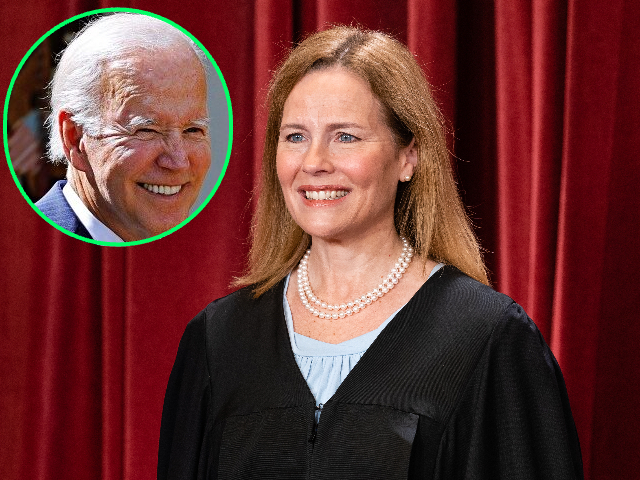WASHINGTON, DC – President Joe Biden falsely claimed Friday that the Supreme Court sided with his student debt transfer, because Justice Amy Coney Barrett had no choice but to reject one lawsuit because of a jurisdictional issue, while other challenges may succeed.
Biden claimed at a political event Friday that the justices have ruled in favor of his program, saying, “Just yesterday … the Supreme Court said, ‘No, we’re on Biden’s side.’”
That is false. When the Supreme Court declines to grant an emergency stay it does not indicate what the court thinks about the merits of the case. All that happened was Barrett denied the application without comment, and the decision was hers alone, not the Supreme Court’s (which acts by majority vote).
Biden ordered Education Secretary Miguel Cardona to use a generic student loan-adjustment law to transfer half a trillion dollars of student debt from millions of Americans who willingly took on that debt to tens of millions of Americans who did not go to college or already paid off their college loans. It is one of the largest wealth transfers in U.S. history, and it was done without congressional action.
The White House believed it would persuade young Americans to vote Democrat next month. That is called vote-buying.
Lawsuits are underway. One from Wisconsin effectively just reached the end of the road when Barrett denied relief in the case, but conservatives should not be dismayed.
That is because the lawsuit was brought by the Brown County Taxpayers Association, on behalf of – wait for it – taxpayers.
But Article III of the Constitution requires that a plaintiff must have directly suffered some distinct personal injury to invoke the power of the federal courts to decide a lawsuit. It is a doctrine that limits the power of unelected judges in America’s democratic form of government.
The Supreme Court in its 1923 case Frothingham v. Mellon held that being a taxpayer does not give a person standing to sue over how the government is misusing that person’s tax money. Every American would always have something to sue over.
The only exception to that in 1968 – the most liberal Supreme Court year in history – the court held in Flast v. Cohen that taxpayers have standing to argue that public displays of faith violate the Establishment Clause.
But taxpayers cannot sue for other issues. Even if they could, the Supreme Court adds that it must be over something the legislature has done, not the executive branch.
This well-meaning Wisconsin group was not asserting any basis for standing other than being taxpayers. It was inevitable that the case would be dismissed, and that a conservative-majority three-judge panel on the U.S. Court of Appeals for the Seventh Circuit would unanimously reject an emergency motion to stay that decision, as it did.
The taxpayer group then asked Barrett for an emergency stay, which is rarely granted in any event. She unilaterally denied the application, rather than refer it to the other eight justices.
None of that is a reflection on the legal merits of the challenge. There are other challenges to Biden’s student debt transfer currently in court or being developed, some of which assert a basis for standing other than merely being taxpayers.
One such challenge could follow a Republican takeover of the U.S. House, as the GOP majority sworn in on January 3 would then have standing to challenge Biden’s power grab.
Breitbart News senior legal contributor Ken Klukowski is a lawyer who served in the White House and Justice Department.

COMMENTS
Please let us know if you're having issues with commenting.